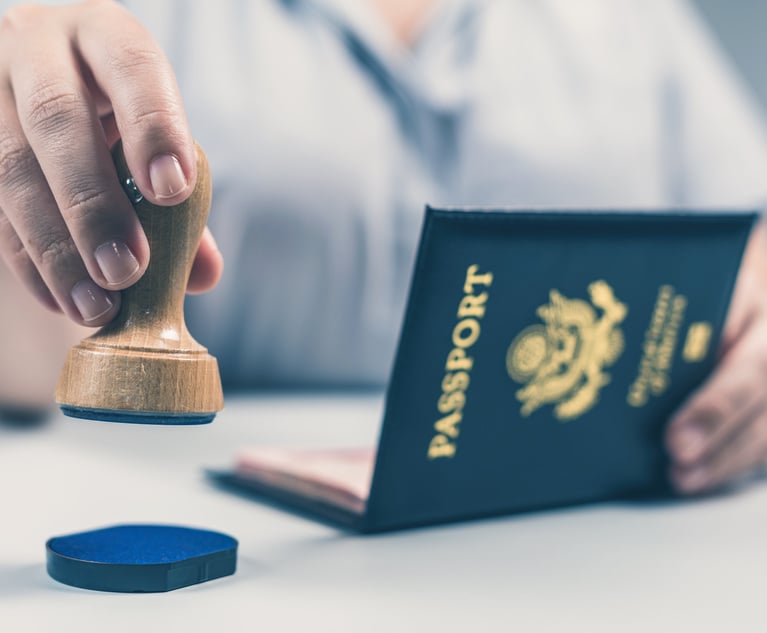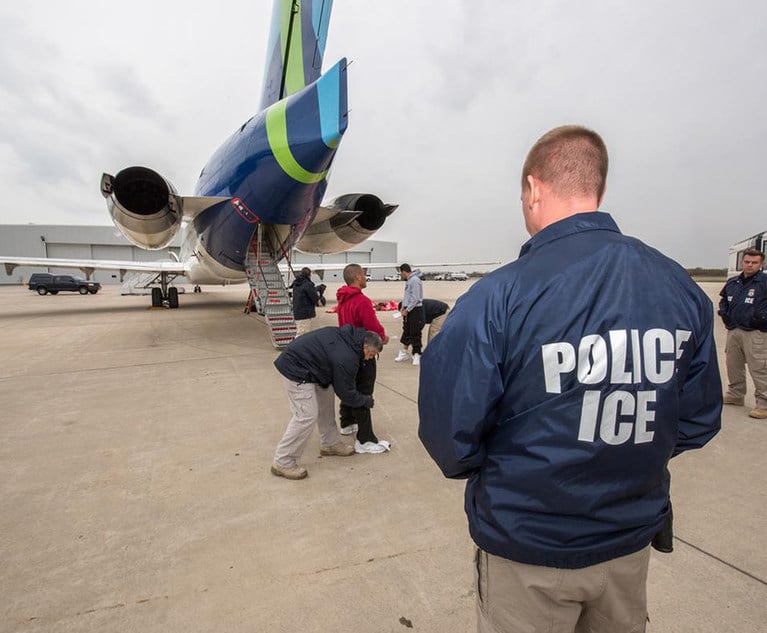Preparing for I-9 Audits Under the Trump Administration
Immigration Law columnist Lisa M. Koenig writes: Given the renewed enforcement focus by both ICE and DOJ on immigration compliance, the nearly doubled civil fines available to both agencies, and the potential criminal liability for employment verification misconduct, employers are well advised to establish or strengthen their immigration compliance programs, and to ensure that regular I-9 audits are a feature of such programs.
June 14, 2017 at 02:04 PM
21 minute read
The federal government's employment eligibility verification form (Form I-9) is a seemingly simple form whose completion is, in fact, fraught with pitfalls for the unwary employer. Since the inception of employer sanctions in the mid 1980s, government investigations of employers' I-9 compliance have been a key part of both Democratic and Republican administrations' efforts to combat unauthorized immigration.
Three factors are now combining to increase corporate I-9 risk: (1) The Trump Administration has issued policy directives to enhance “interior enforcement” and has proposed budget increases for Immigration and Customs Enforcement (ICE) to give it the resources to achieve these policy objectives; (2) recent statutory increases to civil fines for both I-9 noncompliance and I-9-related anti-discrimination violations make even “paperwork errors” a more expensive proposition, and (3) federal prosecutors are showing an increased interest in proceeding criminally against employment verification failures.
President Trump, in his Buy American and Hire American Executive Order (E.O. 13788 of April 18, 2017, published at 82 Fed. Reg. 18837 (April 21, 2017)), directed the Secretary of State, the Attorney General, the Secretary of Labor, and the Secretary of Homeland Security to protect the interests of U.S. workers in the administration of the immigration system, including through the prevention of fraud or abuse.
This content has been archived. It is available through our partners, LexisNexis® and Bloomberg Law.
To view this content, please continue to their sites.
Not a Lexis Subscriber?
Subscribe Now
Not a Bloomberg Law Subscriber?
Subscribe Now
NOT FOR REPRINT
© 2025 ALM Global, LLC, All Rights Reserved. Request academic re-use from www.copyright.com. All other uses, submit a request to [email protected]. For more information visit Asset & Logo Licensing.
You Might Like
View All
As Second Trump Administration Approaches, Businesses Brace for Sweeping Changes to Immigration Policy

Immigration Under the Trump Administration: Five Things to Expect in the First 90 Days
10 minute read
Trending Stories
- 1Deal Watch: Latham, Paul Weiss, Debevoise Land on Year-End Big Deals. Plus, Mixed Messages for 2025 M&A
- 2Bathroom Recording Leads to Lawyer's Disbarment: Disciplinary Roundup
- 3Conn. Supreme Court: Workers' Comp Insurance Cancellations Must Be Unambiguous
- 4To Avoid Conflict, NYAG Hands Probe Into Inmate's Beating Death to Syracuse-Area DA
- 5Scripture-Quoting Employee Sues Company for Supporting LGBTQ Pride
Who Got The Work
Michael G. Bongiorno, Andrew Scott Dulberg and Elizabeth E. Driscoll from Wilmer Cutler Pickering Hale and Dorr have stepped in to represent Symbotic Inc., an A.I.-enabled technology platform that focuses on increasing supply chain efficiency, and other defendants in a pending shareholder derivative lawsuit. The case, filed Oct. 2 in Massachusetts District Court by the Brown Law Firm on behalf of Stephen Austen, accuses certain officers and directors of misleading investors in regard to Symbotic's potential for margin growth by failing to disclose that the company was not equipped to timely deploy its systems or manage expenses through project delays. The case, assigned to U.S. District Judge Nathaniel M. Gorton, is 1:24-cv-12522, Austen v. Cohen et al.
Who Got The Work
Edmund Polubinski and Marie Killmond of Davis Polk & Wardwell have entered appearances for data platform software development company MongoDB and other defendants in a pending shareholder derivative lawsuit. The action, filed Oct. 7 in New York Southern District Court by the Brown Law Firm, accuses the company's directors and/or officers of falsely expressing confidence in the company’s restructuring of its sales incentive plan and downplaying the severity of decreases in its upfront commitments. The case is 1:24-cv-07594, Roy v. Ittycheria et al.
Who Got The Work
Amy O. Bruchs and Kurt F. Ellison of Michael Best & Friedrich have entered appearances for Epic Systems Corp. in a pending employment discrimination lawsuit. The suit was filed Sept. 7 in Wisconsin Western District Court by Levine Eisberner LLC and Siri & Glimstad on behalf of a project manager who claims that he was wrongfully terminated after applying for a religious exemption to the defendant's COVID-19 vaccine mandate. The case, assigned to U.S. Magistrate Judge Anita Marie Boor, is 3:24-cv-00630, Secker, Nathan v. Epic Systems Corporation.
Who Got The Work
David X. Sullivan, Thomas J. Finn and Gregory A. Hall from McCarter & English have entered appearances for Sunrun Installation Services in a pending civil rights lawsuit. The complaint was filed Sept. 4 in Connecticut District Court by attorney Robert M. Berke on behalf of former employee George Edward Steins, who was arrested and charged with employing an unregistered home improvement salesperson. The complaint alleges that had Sunrun informed the Connecticut Department of Consumer Protection that the plaintiff's employment had ended in 2017 and that he no longer held Sunrun's home improvement contractor license, he would not have been hit with charges, which were dismissed in May 2024. The case, assigned to U.S. District Judge Jeffrey A. Meyer, is 3:24-cv-01423, Steins v. Sunrun, Inc. et al.
Who Got The Work
Greenberg Traurig shareholder Joshua L. Raskin has entered an appearance for boohoo.com UK Ltd. in a pending patent infringement lawsuit. The suit, filed Sept. 3 in Texas Eastern District Court by Rozier Hardt McDonough on behalf of Alto Dynamics, asserts five patents related to an online shopping platform. The case, assigned to U.S. District Judge Rodney Gilstrap, is 2:24-cv-00719, Alto Dynamics, LLC v. boohoo.com UK Limited.
Featured Firms
Law Offices of Gary Martin Hays & Associates, P.C.
(470) 294-1674
Law Offices of Mark E. Salomone
(857) 444-6468
Smith & Hassler
(713) 739-1250







